Review and photos by amargasaurus cazaui, edited by Suspsy
In 2005, a fossil specimen surfaced at the Tuscon Gem and Mineral Show that would soon set the world of paleontology on end. The slab, containing a single specimen of Psittacosaurus, had been preserved in such a way that it would soon yield a treasure trove of scientific firsts, new information, and depth to our understanding of this species. Most notable were the bristle-like tail structures exquisitely preserved. The specimen was so well-preserved, melanosomes establishing colouration, patterning, and shading were found. The specimen appears to be one of the few with intact melanosomes which establish colour in a non-avian dinosaur. It is seemingly the first dinosaur we have actual preserved scales for as well.
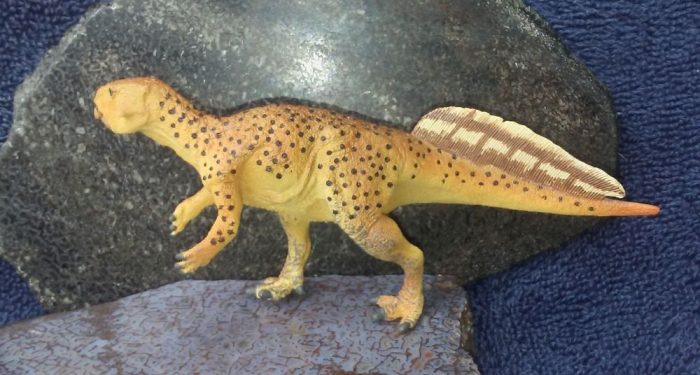
The toy market has very few examples of Psittacosaurus done in a more life-like realistic style, that are also generally available. The Carnegie Collection produced the most well-known and treasured version of the dinosaur, sculpted by Forest Rogers. A smaller, more bird-like version was issued by CollectA. As one of the most well-known and studied dinosaurs, the market seemed ripe for a more accurate and appealing version.
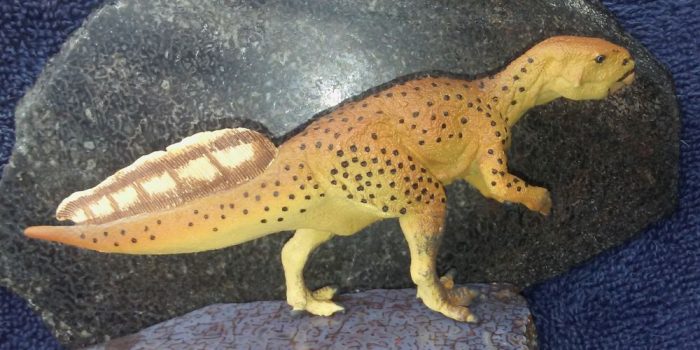
Enter Doug Watson and the Wild Safari company. In the final months of 2016, Safari announced and released a new model of Psittacosaurus for the collector market. In my discussions with the sculptor, I was able to learn his sculpt was an attempt to translate the Tucson specimen, now known as Senckenberg Museum R 4970, into the most accurate model possible. The model is intended to be P. mongoliensis and was intended to be scaled at 1/12 size. This would place the model as an adult.
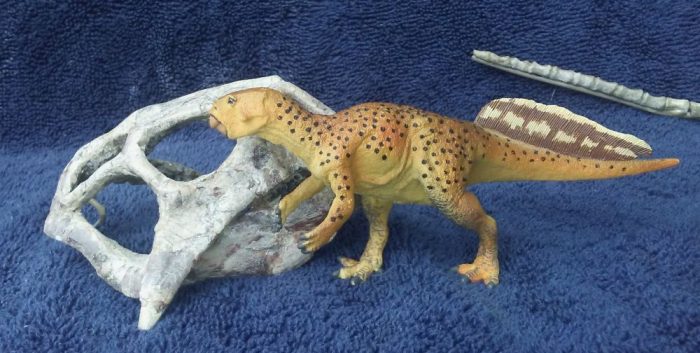
The model itself is smallish in size, measuring roughly 2 1/4 inches tall at the head and slightly over 5 1/2 inches in length along the vertebrae. It balances fairly well on its legs, with its feet placed in a normal walking pose. The tail is slightly curved and demonstrates the famous quills that the specimen is known for. The hands are sculpted in an opposing or neutral position with the proper digits, including the vestigial traces of the fourth digit without a claw. The body demonstrates the appropriate musculature, and in no way appears shrink-wrapped. The head is properly shaped, with jutting jugals, a nicely formed rostral, and properly placed eyes and nostrils. The frill is quite subdued, but visible.
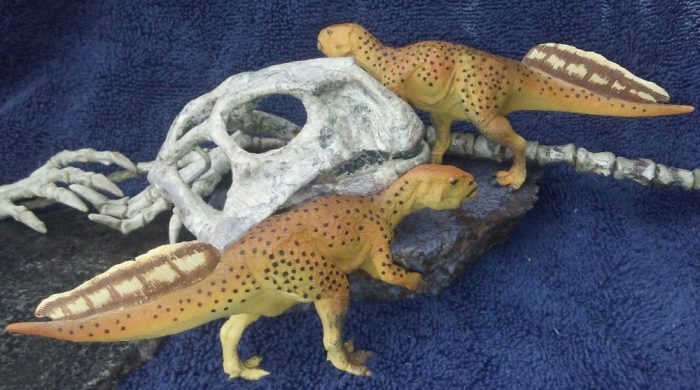
The colouration is inspired by and follows the information given for Specimen R 4970 fairly closely. It features lighter undershading and darker overtones, darker individual scales, and an overall palette of browns, tans, and rust colours. The colouring for the bristle-like structures would seem a decent possibility, and the overall aesthetic is pleasing.
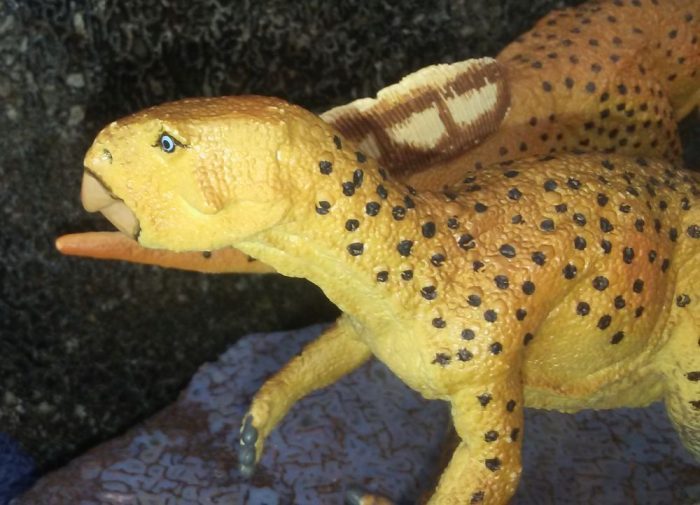
What are my own thoughts? I would like to have seen this model given to us at a larger size, perhaps 1/6 scale, although that is more a personal preference. My only other possible nitpick might be for more pronounced jugals. In my discussions with Doug Watson, he had commented that he was not convinced regarding the jugals, whereas I think they would be even more pronounced and angular. On the plus side, I find the overall effect is a well done and carefully researched masterpiece. The colors are believable, the posture is borne out by evidence, and the unique features this dinosaur is so well known for are evident and well done. The bristle-like structures match the fossil, and are placed properly. The figure stands decently on its feet, balances well, and looks quite lifelike. I feel it is the best mass market toy offered for this species. Props to Doug Watson and Safari!
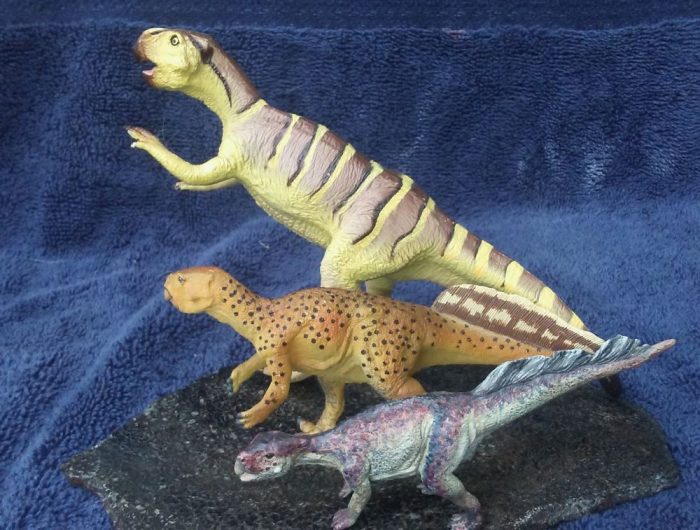
The Psittacosaurus sells affordably around the ten dollar price point and seems quite readily available on eBay, Amazon, and most major online dinosaur stores. A nice, fairly priced, and well-sculpted dinosaur, readily available on the market!
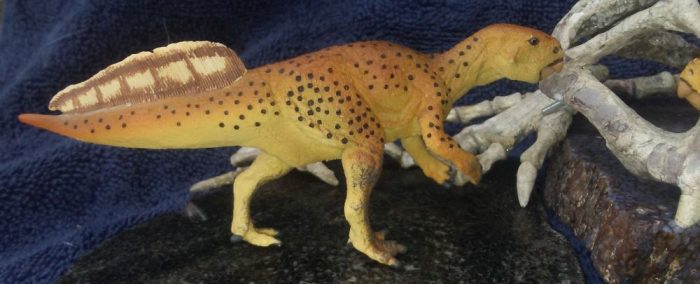
Disclaimer: links to Ebay and Amazon on the DinoToyBlog are affiliate links, so we make a small commission if you use them. Thanks for supporting us!




I also love the psittacosaurus skeleton/replica which you have used in the background.
It looks like the psittacosaurus models are mooring over the dead one.
It is an actual psittacosaurus skeleton….or parts of one. I thought it was fitting for the review
I love how Safari Ltd uses inspiration/reference from modern animals to develop their colors/paint jobs on their prehistoric animal and dinosaur models. This paint job makes like the animal using/depending on the colors of its skin to camouflage/hide from from predators in the desert habitat of Mongolia where it lived in the Early Cretaceous. Despite its small size, it does not fail to impress the collector. I love the patterns also. It is possible that only the males had quills on their tail:
Because among the 400 psittacosaurus fossils found, only one had quills on its tail, it is also one of the best understood dinosaurs of the early cretaceous, Very detailed review.
Great review, thanks! And a great toy too. Looks excellent.
Some things I’ve been thinking about in palaeoart are counter-shrinkwrapping, and the recent assertion of how depictions of the caudofemoralis muscles of dinosaurs have been too weedy; and how much the beefed-up look might obscure the posterior contour of the thigh muscles. The large patagium apparent in R 4970 adds to that, making me think Psittacosaurus and other dinosaurs might have a relatively smooth, concave curve at the back of the hind leg, similar to the appearance of a lot of digitigrade mammals. But (getting to my point eventually) the legs on this model seem like fairly standard dinosaurian, Bakker-Paul ‘drumsticks’.
Not a complaint, though. I’m just curious about the design process and the decisions made. Maybe it was thought the patagium was flattened out in fossilisation, like the plumage of feathered dinos? I dunno.
There is disagreement on whether that part of the leg actually represents a patagium or not, though. That part of the leg has been known since the specimen was revealed, it has just been interpreted as a fat leg squashed flat.
The “official” model also seems to have had too large eyes.
Very nice review, and a nice figure, for sure–but how is it significantly better that the similarly colored and older CollectA figure?
I do not feel the Collecta figure is similarly colored by any argument that might be made, but more specifically this figure IS colored in a pattern and using the colors and shades suggested by a few recent papers written on this specimen. The dark colored larger scales, the counter-shading are all born out by the studies done on the actual fossil.The Collecta has no counter shading and bears no darker scales at all for instance. Aside from that, the hands and posture of the arms for the Collecta model appear to be pronated, the hands are improperly sculpted, the tail filaments are not long enough and appear broken in patches and do not match the evidence, the rostral is not done correctly…to name only a few issues. The Collecta piece has its charm, but cannot be said to possess the same accuracy as the newer and more well researched figure.
Another beautiful Safari product.
My compliments to Guest Reviews what I would have wanted from this extraordinary and beautiful psittacosaurus of the genius Doug Watson that said figure was the same size as his predecessor of Carnegie that appears next to the photo. For everything else is fabulous even thanks to its small but artistic and scientific cheap size at the same time, it must be recognized that said figure does not occupy space.
This year Safari has made the best figures of its history and has been a great year for Safari in all aspects, thanks to the work of Doug Watson and other Safari sculptors who year after year give enthusiasm to collectors especially and also to the kids. Ideal for children’s play and for collectors.
Concluding my congratulations to Guest Reviews whose reviews of him and the rest of the members of dinotoyblog.com without exception are a luxury for those who read them.
Nice review, my only complaint about the figure is the quite narrow head which should be fairly broader when looked up from front or top and which can be so nicely seen in that Bristol University model. However, despite this nitpick I deem that model the best and most accurate of this year’s Safari lineup. A must for every dino collector.